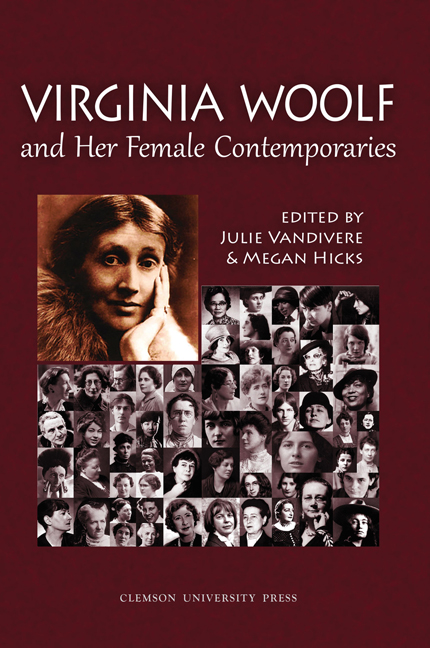Book contents
- Frontmatter
- Table of Contents
- Introduction
- Acknowledgments
- Abbreviations
- Who Are Virginia Woolf's Female Contemporaries?
- Virginia Woolf's Cultural Contexts
- Virginia Woolf and the Book Society Limited
- The Outsider as Editor: Three Guineas and the Feminist Periodical
- Woolf 's Imperialist Cousins: Missionary Vocations of Dorothea and Rosamond Stephen
- Mary Sheepshanks, Virginia Stephen, and Morley College: Learning to Teach, Learning to Write
- Moving Picture This: Virginia Woolf in the British Good Housekeeping!? or Moving Picture This: Woolf 's London Essays and the Cinema
- “Quota Quickies Threaten Audience Intelligence Levels!”: The Power of the Screen in Virginia Woolf 's “The Cinema” and “Middlebrow” and Betty Miller's Farewell Leicester Square
- Virginia Woolf's Contemporaries Abroad
- Virginia Woolf's Contemporaries at Home
- Tribute to Jane Marcus
- Notes on Contributors
- Conference Program 223
Mary Sheepshanks, Virginia Stephen, and Morley College: Learning to Teach, Learning to Write
from Virginia Woolf's Cultural Contexts
- Frontmatter
- Table of Contents
- Introduction
- Acknowledgments
- Abbreviations
- Who Are Virginia Woolf's Female Contemporaries?
- Virginia Woolf's Cultural Contexts
- Virginia Woolf and the Book Society Limited
- The Outsider as Editor: Three Guineas and the Feminist Periodical
- Woolf 's Imperialist Cousins: Missionary Vocations of Dorothea and Rosamond Stephen
- Mary Sheepshanks, Virginia Stephen, and Morley College: Learning to Teach, Learning to Write
- Moving Picture This: Virginia Woolf in the British Good Housekeeping!? or Moving Picture This: Woolf 's London Essays and the Cinema
- “Quota Quickies Threaten Audience Intelligence Levels!”: The Power of the Screen in Virginia Woolf 's “The Cinema” and “Middlebrow” and Betty Miller's Farewell Leicester Square
- Virginia Woolf's Contemporaries Abroad
- Virginia Woolf's Contemporaries at Home
- Tribute to Jane Marcus
- Notes on Contributors
- Conference Program 223
Summary
The threads weaving Virginia Stephen and Mary Sheepshanks together are somewhat tenuous, though Julia Briggs calls Sheepshanks one of Stephen's early mentors (89). Mary Sheepshanks, well-known in her day, would be almost totally forgotten now if it were not for Sybil Oldfield's biography, Spinsters of This Parish: The Life and Times of F. M. Mayor and Mary Sheepshanks. In that book, Oldfield frequently refers to and uses the unpublished autobiography Sheepshanks wrote in her eighties, The Long Day Ended; the typescript resides in the archives of the Women's Library at the London School of Economics. Sheepshanks's letters are scattered in other collections, including that of Bertrand Russell. Perhaps the threads identified by Oldfield cannot be strengthened, but here I'd like to speculate, articulate questions, and pull some things together.
When Virginia Stephen was recovering from the depression and strain over the caretaking and death of her father and a suicide attempt in 1904 (Bell 1: 89–90), Frederic Maitland asked her to write about her father's later years for his biography of Leslie Stephen. Violet Dickinson suggested she write for the Guardian's women's pages, edited by Mrs. Arthur Lyttelton. And Miss Mary Sheepshanks, “a large kindly & rather able sort of woman” who was serving as the de facto principal of Morley College, asked her to “start a girls club at Morley, & talk about books!” (PA 217). Morley College was an institution in Lambeth attempting to provide what we now call a secondary education to workingclass adults who had been woefully underserved by England's educational system. As I've argued elsewhere, the latter job offer proved crucial to Virginia Stephen, because as she was writing reviews and her first essays for an audience she had to imagine (Guardian readers), she was also interacting with real working-class adult students at Morley College, students who led her to reconsider her relationship with them within the classroom and, thus, to reconsider the relationship between writer and reader within the essay. Teaching at Morley taught Woolf how to teach—in print.
- Type
- Chapter
- Information
- Virginia Woolf and Her Female Contemporaries , pp. 69 - 75Publisher: Liverpool University PressPrint publication year: 2016



